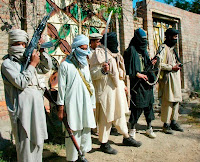I like General Petraeus and I generally have faith in the things he says during his interviews. I have confidence that he will be able to lead our troops to some sort of acceptable victory condition (outright victory is just not in the cards under our current political situation). He gave an interview last week which some of my friends found very encouraging. After reading it, I was not quite so happy. I had the feeling someone had just peed on my pants leg and tried to tell me it was raining.
According to a FOX News report, Gen. David Petraeus said in an interview that a surge in coalition troops has turned the tide on the Taliban's "momentum" there, but warned tough battles still lie ahead. Petraeus also played down the prospect of a rapid withdrawal of U.S. troops next year, repeating his insistence that a target of July 2011 was merely a "date when a process begins -- nothing more, nothing less." "It is not the date when the American forces begin an exodus and look for the exit and the light to turn off on the way out of the room," he said in a BBC interview recorded in Kabul.
As the death toll of U.S. troops in Afghanistan rose again with the death of four soldiers on Sunday, Petraeus said the road ahead could be bloody but insisted foreign forces were making progress. "The momentum that the Taliban have established over the course of recent years has been reversed in many areas and will be reversed in the other areas as well. This will entail tough fighting," he told the British broadcaster.
Here is where I began to feel like I should be ducking: Petraeus warned, however, that further progress to force Taliban fighters out of their remaining safe havens will entail tough fighting. "It gets harder before it gets easier," he said.
In late 2009, Obama authorized to grow the force in Afghanistan by 30,000 to 100,000 troops -- triple the level from 2008 -- but promised to begin withdrawing forces by July.
"July 2011... is the date when a process begins. It is not the date when the U.S. forces begin an exodus and look for the exit and a light to turn out," he said.
Petraeus, who's been credited with a successful war strategy in Iraq, insisted he wouldn't shirk from offering Obama difficult advice on the drawdown. "When you go into a job like this ... you think that it's your last job, that's what I did in Iraq. You are determined to do the very best you can, in this particular position, to provide your most forthright assessments and advice," Petraeus said. I could not help but wonder if he was trying to convince the President or us.
The interview came as U.S. and Afghan forces prepare for an assault next month into the birthplace of the Taliban. In Zhari, a district just west of Kandahar, insurgents funnel fighters, drugs, explosives and stage attacks into the city. Senior commanders call the fight for Zhari the next step — Phase 3 — of a wider campaign to pacify Kandahar, the country's second largest city, and surrounding countryside. They argue success in Kandahar could lead to overall victory, given that the Taliban's power base is rooted in this region.
Zhari itself remains insurgent territory despite five major NATO operations in recent years. In September 2006, a Canadian-led force launched a major operation in Zhari and nearby Panjwai district, pushing out the Taliban but at a cost of 28 coalition lives. Months later, the Taliban were back.
Militarily, Lt. Col. Peter N. Benchoff will have to seize the village of Singesar, site of Taliban leader Mullah Mohammad Omar's Islamic school now defended by fortified trenches, mortars and mines, and stop Taliban movements and ambushes along Highway 1 and a parallel dirt road dubbed Iron City. Getting the area's 10,000 inhabitants to sever their links to the Taliban may prove even harder.
With the opening salvo of the push already on the planning boards, perhaps the densest concentration of forces in Afghanistan today has been marshaled: some 1,000 U.S. and 400 Afghan troops, a superb, rarely realized ratio for counterinsurgency operations of one soldier for every 10 civilian residents. "We are now poking the bear, trying to figure out how he will react and then developing ways to set him up to our advantage," Benchoff, who commands the 2nd Battalion, 502nd Infantry Regiment of the 101st Airborne Division, told The Associated Press. "We are taking our time to do it right. We don't want to charge in with shock and awe like in Marjah, and then come out scratching our heads and saying, 'What happened here?'"
Marjah, a town in neighboring Helmand province, was captured in a highly heralded operation in February but has yet to see either solid security or effective government presence.
"Will it work? I'm a guarded optimist. This is the last best way I know," the officer, from Lancaster, Pennsylvania, said. "This is an enemy-controlled area and people either support the Taliban actively or passively in order to survive," he says. "People want security but they are not fed up enough to turn to the government. We have grandfathers, fathers, uncles who are charter-founding members of the Taliban. It is going to take a long-term, dedicated, persistent effort to win."



No comments:
Post a Comment